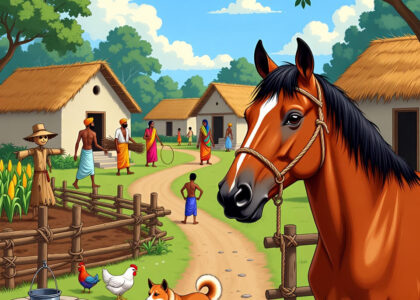Meaning:
The proverb “beggars can’t be choosers” conveys the idea that when one is in a position of extreme need or dependency, they should not be overly selective or demanding about what they receive. It suggests that when someone is relying on the generosity or assistance of others, they should be grateful for whatever help they receive, without making specific demands or expecting to have control over the outcome. The proverb emphasizes the importance of humility, gratitude, and the understanding that when in dire circumstances, one should not possess the luxury of being selective or demanding. It serves as a reminder to appreciate the kindness and support offered by others, regardless of the specifics.
Understanding The Idea:
The proverb “beggars can’t be choosers” reflects the notion that individuals who find themselves in a state of desperate need or reliance on others should not possess the luxury of being overly selective or demanding. It embodies a sense of humility and gratitude for any assistance or generosity they receive.
In a literal sense, a beggar is someone who relies on the goodwill of others to meet their basic needs. They do not have the means or resources to be picky about what they receive. When one is in such a position, the focus shifts from personal preferences to survival and basic sustenance. The proverb reminds us that when faced with extreme circumstances, it is crucial to acknowledge and appreciate the support provided by others, regardless of its specific form or magnitude.
Metaphorically, the proverb extends beyond material or financial assistance and applies to various situations in life. It suggests that in times of vulnerability, dependence, or limited options, one should be grateful for any opportunities or help that come their way. Whether it’s a job offer, an educational opportunity, or any other form of aid, being too demanding or selective can hinder progress and hinder the chances of improving one’s situation.
The proverb also highlights the importance of acknowledging the power dynamics involved in situations of need. When one relies on the kindness of others, they are at a disadvantage and lack the agency to dictate terms or conditions. It serves as a reminder to be humble and appreciative, recognizing the effort and goodwill extended by others.
However, it is essential to note that this proverb does not justify exploitation or mistreatment of those in need. It should not be used to perpetuate a cycle of dependency or to justify providing subpar support. Instead, it emphasizes the notion of gratitude, humility, and a willingness to accept help when it is genuinely needed.
Overall, the proverb “beggars can’t be choosers” encapsulates the idea that when faced with dire circumstances or reliance on others, it is crucial to show gratitude and appreciation for any assistance received, regardless of its specific form or magnitude. It reminds us to approach such situations with humility and to recognize the efforts of those who lend a helping hand.
Story1: A Beautiful Story on “Beggars can’t be Choosers”
Once upon a time, in the bustling metropolis of Veridian City, there lived a young man named Ethan. Raised in a modest neighborhood, Ethan had always dreamt of a better life. He had big aspirations, yearning for a successful career and a comfortable lifestyle. However, circumstances had not been kind to him.
Despite his best efforts, Ethan found himself caught in the relentless grip of urban life. The job market was fiercely competitive, and the cost of living was soaring higher each passing day. Despite his qualifications, Ethan struggled to secure stable employment that could provide him with the means to escape his current situation.
Days turned into weeks, and weeks turned into months. Ethan’s savings dwindled, leaving him on the verge of desperation. He soon realized that he needed to swallow his pride and seek help from others. He found himself standing at the city’s busiest intersection, his trembling hand clutching a cardboard sign that read, “Anything helps.”
As pedestrians hurried by, lost in their own world, Ethan felt a sense of vulnerability and humility. The once ambitious and independent young man was now forced to rely on the kindness of strangers. With each passerby that ignored his plea or averted their gaze, Ethan’s hope wavered.
But amidst the sea of indifferent faces, there was one person who paused. A middle-aged woman named Sarah, who had seen Ethan at the intersection day after day, felt compelled to help. She approached him with a warm smile, offering a bag of sandwiches and a bottle of water. Ethan’s heart swelled with gratitude.
Over time, Sarah’s act of kindness sparked a connection between them. She introduced him to local shelters, employment programs, and support networks that could assist him in getting back on his feet. Through Sarah’s guidance and encouragement, Ethan regained a glimmer of hope. He realized that in his dire circumstances, he couldn’t afford to be picky or demanding. He had to be grateful for any opportunity that would lead him toward a better life.
With newfound determination, Ethan dove into every chance that came his way. He took on odd jobs, volunteered at community organizations, and seized every learning opportunity that presented itself. Though the road was arduous and progress came in small increments, Ethan’s perseverance paid off.
Months turned into years, and Ethan slowly but steadily built a foundation for a brighter future. He secured a stable job and a modest apartment. While it wasn’t the grandeur he had once dreamt of, he was grateful for the stability and independence it brought him. Ethan had come to understand the true meaning behind the proverb “beggars can’t be choosers.”
Reflecting on his journey, Ethan recognized the power of humility and gratitude in navigating the complexities of urban life. He appreciated the support and compassion offered by Sarah, as well as the countless individuals who had extended a helping hand along the way. Ethan vowed to pay it forward, to be mindful of the struggles of others, and to offer assistance whenever he could.
In the urban jungle, where dreams clashed with reality, Ethan had learned that sometimes, in order to rise above adversity, one must set aside their ego and be grateful for the opportunities that come their way. And through his own experience, he had discovered that the kindness of strangers could spark a flicker of hope that eventually grew into a flame of resilience and success.
Story 2: A Beautiful Story on “Beggars can’t be Choosers”
In the serene countryside of Greenfield Village, nestled amidst rolling hills and fields of golden wheat, lived a humble farmer named Jacob. Life in the rural landscape had its own rhythm, dictated by the changing seasons and the hard work required to sustain a livelihood. Jacob, with weathered hands and a heart rooted in simplicity, knew the true meaning of the proverb “beggars can’t be choosers.”
Jacob’s family had farmed the land for generations, relying on the bounties of nature for their sustenance. However, an unforeseen drought cast a shadow over the village, leaving fields barren and hope scarce. As the once-vibrant crops withered, so did Jacob’s spirit. The harvest he had depended on for survival seemed uncertain, and he feared the burden of scarcity.
Recognizing the dire situation, Jacob swallowed his pride and sought help from his fellow villagers. In a community where everyone understood the fragility of life and the interdependence of its members, he found solace. With open hearts, the villagers extended their support, sharing their meager resources and offering encouragement. It was in this moment of vulnerability that Jacob understood the true essence of unity.
Days turned into weeks, and the village worked tirelessly to alleviate the effects of the drought. Together, they devised innovative irrigation methods, pooling their knowledge and resources to make the most of the limited water supply. Jacob and his fellow farmers toiled under the scorching sun, knowing that their collective efforts were their best chance at survival.
Gradually, nature responded to their determination. Rain clouds rolled in, bringing long-awaited relief to the parched land. The fields began to show signs of life once again, and Jacob’s heart swelled with gratitude for the generosity and resilience of his community.
As the harvest season arrived, the village rejoiced. The once-barren fields now bore the fruits of their labor, and a sense of abundance permeated the air. Jacob, with a deep appreciation for the interconnectedness of rural life, realized that he could not have made it through the challenging times without the help of his neighbors.
Moved by the spirit of gratitude and understanding, Jacob resolved to reciprocate the kindness he had received. He offered his assistance to fellow farmers who had faced setbacks of their own, lending a helping hand wherever it was needed. He embraced the wisdom that when living in harmony with nature and relying on the goodwill of others, one could not afford to be choosy. Every act of support, no matter how small, was to be treasured.
In the years that followed, Greenfield Village prospered. The memory of the drought lingered, serving as a reminder of the collective strength and resilience of the community. Jacob became a pillar of support, fostering a culture of gratitude and cooperation. Together, the villagers weathered the storms that rural life brought their way, understanding that in times of need, the power of unity and the humility to accept help were invaluable.
In the rustic simplicity of rural life, Jacob discovered that the proverb “beggars can’t be choosers” held true. It was through his own journey, marked by reliance on his community, that he learned the profound significance of gratitude, humility, and the interconnectedness that binds rural life together. And amidst the vastness of nature’s canvas, Jacob’s heart bloomed with gratitude for the blessings that had come his way, forged through the generosity and support of those around him.










